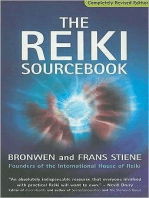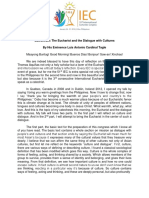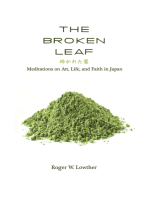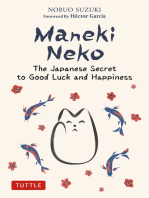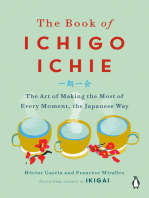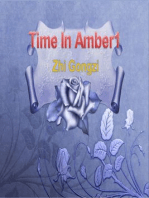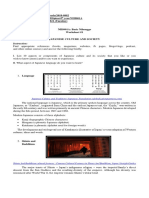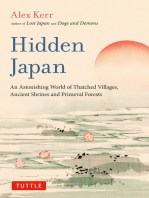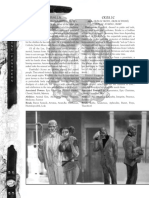0 ratings0% found this document useful (0 votes)
156 views"Shukatsu" Is A New Phenomenon That The Elderly Have Embraced It Means Preparing For The End
"Shukatsu" Is A New Phenomenon That The Elderly Have Embraced It Means Preparing For The End
Uploaded by
Reihan AndhikaThe document discusses how Japan's funeral industry is adapting to changes in society, such as an aging population and increasing number of childless couples. It describes innovative new options like scattering ashes in space for $6,000 or storing ashes in high-tech "skyscraper graveyards." However, some traditional funeral directors criticize how the industry has become more commercialized and worry that simpler, cheaper funerals will burden the business and threaten traditional ways of death and burial.
Copyright:
© All Rights Reserved
Available Formats
Download as DOCX, PDF, TXT or read online from Scribd
"Shukatsu" Is A New Phenomenon That The Elderly Have Embraced It Means Preparing For The End
"Shukatsu" Is A New Phenomenon That The Elderly Have Embraced It Means Preparing For The End
Uploaded by
Reihan Andhika0 ratings0% found this document useful (0 votes)
156 views6 pagesThe document discusses how Japan's funeral industry is adapting to changes in society, such as an aging population and increasing number of childless couples. It describes innovative new options like scattering ashes in space for $6,000 or storing ashes in high-tech "skyscraper graveyards." However, some traditional funeral directors criticize how the industry has become more commercialized and worry that simpler, cheaper funerals will burden the business and threaten traditional ways of death and burial.
Original Description:
l
Original Title
in Japan
Copyright
© © All Rights Reserved
Available Formats
DOCX, PDF, TXT or read online from Scribd
Share this document
Did you find this document useful?
Is this content inappropriate?
The document discusses how Japan's funeral industry is adapting to changes in society, such as an aging population and increasing number of childless couples. It describes innovative new options like scattering ashes in space for $6,000 or storing ashes in high-tech "skyscraper graveyards." However, some traditional funeral directors criticize how the industry has become more commercialized and worry that simpler, cheaper funerals will burden the business and threaten traditional ways of death and burial.
Copyright:
© All Rights Reserved
Available Formats
Download as DOCX, PDF, TXT or read online from Scribd
Download as docx, pdf, or txt
0 ratings0% found this document useful (0 votes)
156 views6 pages"Shukatsu" Is A New Phenomenon That The Elderly Have Embraced It Means Preparing For The End
"Shukatsu" Is A New Phenomenon That The Elderly Have Embraced It Means Preparing For The End
Uploaded by
Reihan AndhikaThe document discusses how Japan's funeral industry is adapting to changes in society, such as an aging population and increasing number of childless couples. It describes innovative new options like scattering ashes in space for $6,000 or storing ashes in high-tech "skyscraper graveyards." However, some traditional funeral directors criticize how the industry has become more commercialized and worry that simpler, cheaper funerals will burden the business and threaten traditional ways of death and burial.
Copyright:
© All Rights Reserved
Available Formats
Download as DOCX, PDF, TXT or read online from Scribd
Download as docx, pdf, or txt
You are on page 1of 6
in Japan
Funerals are big business
With an aging population and more than a million deaths in the country last
year
Finding a final resting place can be difficult and expensive
But the funeral industry is stepping up to the challenge
Finding innovative ways to send their clients into the afterlife
I'm Steve Chang. On this episode of 101 east we take a look at how Japan says
its final goodbyes
Yuuichi Ito and his wife Sumiko spend weekends on their hobby farm in an
idyllic part of central Japan
It's so refreshing being out here, and I'm quite obsessed with nature. We
live in a city
It's very stressful. You can plant saplings
Water them and soon you can eat them
the Ito's live life to the full
But both of them are obsessed with what will happen when they die
You see, the Itos don't have kid's
In modern Japan there's more childless couples and single people than
traditional nuclear families
For many Japanese, it makes dealing with death difficult
Normally when you have a child he will look after the parents when they die
Because we have no children, we talk about what is going to happen when I
retire.
and we decided we need to start preparing now
Some people in Japan live until they're 100 years old. You're both in your
40s
Why are you so concerned about finding
the right
Memorial?
Some of my friends died in their 20's and 30's
life expectancy may be long in Japan, but people die young
Times are changing we've got to adapt
In the past everyone had a job with an increasing salary which paid for your
funeral
You live near your family,
that doesn't happen anymore
If it did
we wouldn't have to think about "shukatsu"
"Shukatsu" is a new phenomenon that the elderly have embraced
It means preparing for the end
And all across Japan they come in their thousands
to funeral expos like this one
Lining up for his first expo
Yuuichi is excited
First of all, I'm curious What kind of people are coming here
also I heard various kinds of companies are here today.
So I'm looking forward to seeing something I'm not expecting
Talking about death used to be taboo in Japan
Now it's a passionate pursuit
Since the word "shukatsu" came out
We can now start talking about funerals openly among healthy people
When you're on your deathbed
everyone has that moment when you think about things that really matter
That's what shukatsu means to me
It is an extended time, like that moment to contemplate life's important
decisions
First up is a one-hour lecture called "writing an ending notebook"
It's much like a will
but there's a personal aspect as well
you write in detail about your legacy and reflect on your very
existence
There was a lot to write down
I've never looked back on my past or my childhood really
I learned today that by thinking back how my life had been
I should adjust how I treat myself, my family, and people around me.
when I get home, I'm going to start writing my ending note
Vendors are here to cash in on an industry worth five billion dollars a year
In just a decade
funeral-related companies have quadrupled in Japan
And some of them have innovative ideas
The Itos have found one company that shoots ashes into space
with the help of America's space Agency, NASA
And it only costs around $6,000
Yuuichi likes the thought of having his ashes scattered across the galaxy
Without children I worry our stone grave would suffer neglect when we are
gone.
We wouldn't worry if our ashes went to space
I thought it would be millions of yen, but space is getting closer to us
The space, it is romantic
It's not the ground not quite a sea
It's interesting
but Sumiko hasn't dismissed the more down-to-Earth options
She has her eye on a coffin
one of the most popular booths today
Masamune Kirihara has been helping potential customers of all ages
all day
so with some guidance, I decide to give it a try myself
Like hands like that, or like that
Like this like this, right?
So what do people look for when they're buying a coffin?
First when you get inside the coffin
people look for patterns and check the thickness of the padding
When you try it many people often imagine what the death is like
They realize their regrets in life
Another reason why people try this coffin
it is said to extend your life
So what makes this coffin better than that coffin?
The bedding is better
the embroidery is more colorful
The lid is dome shaped
And the window is bigger too
This is one weird opportunity to try before you die
Has the death industry in Japan become more commercialized
too much perhaps?
I'm not sure if commercialized is the right word,
but we couldn't display coffin at events like this before.
Now we can
It's not to do with money
instead, It shows people's attitudes are changing.
With so much choice the traditional funeral homes are under threat
ninety-nine percent of Japanese are cremated
That's where traditional funeral director, Satoshi Takeda comes in
We put the coffin here, then the bereaved family join their hands together in
prayer
After that, we'll close this door
The ashes come from the back of the oven
I tell the family where the important body parts are
like the femur and pelvis
Then one family member picks the ashes up with these chopsticks
starting by the feet
Mr. Takeda and 300 other employees at this funeral Company,
Kyoto Kokisha
take a traditional approach
to commemorating death
Today, the altar is being prepared for an afternoon ceremony
From the flowers, to the Bamboo decorations
everything has to be perfect
One important aspect of funerals is displaying the family's crest
Our services feature Shinto buddhist rites
The altar has to be right in the center
We check to make sure the placement of things is perfectly symmetrical
This funeral company has been in existence since 1938
Their eight funeral halls hold more than 6,000 ceremonies a year
A proper send-off is important in Japanese culture
But it is also expensive
Mr.Takeda thinks it will be even tougher to succeed in the future
Because even supermarkets are offering cheap funeral plans
You see ads on the internet for funerals that cost $80
Outsider companies are providing cheaper and cheaper funerals
I think Japan's aging problem will burden the funeral business
They'll become simpler because of the cost
So Mr.Takeda is offering some inventive alternatives in the company showroom
You can put the ashes in these bracelets and locket to honor the memory of
your loved one
It only costs $100
it suits those who have to travel a lot for work and can't pray at the family
temple
Burying ashes in a graveyard is now a luxury
The country is running out of space for the dead
And that's driving up the cost of burial
Take this city cemetery for example
the average price for a plot of land
not the Headstone
just the plot of land is at least
$40,000
The problem is only going to get worse
1.2 million people died in Japan last year
That figure will keep rising until 2042
The aging population is forcing Japan's old ways to change
And those who house the dead realize they have to adapt
Inside this Modern building is a skyscraper graveyard
Priest Ohara runs it
He says old temples usually store 100 urns, and are private
but this temple welcomes anyone and everyone
How many urns are there in this building right now?
We can accept 10,000 urns
This temple was only completed last year
it only has ten percent occupancy so far
On every floor is a row of hi-tech crypts
To visit, you swipe your ID card
which prompts robotic arms to retrieve the family urn from the basement
Then a photo of your loved one appears
The urn is in this box
One Box can hold one to eight urns
These new temples are getting so popular in Japan
that many people are closing the ancestral graves in the countryside and
storing the ashes here
One married couple did it because their children lived in the city and never
came to visit them out there
When they die, they hope their children will come to worship them here
Just down the road
There's another mega hi-tech family crypt
with plenty of space for the departed
"Wow!"
It's quite impressive
There's over
2,000 Buddha statues in this temple, so we've got to find out just where
our urn is
I think it's that blinking one over there
Each family urn is stored directly behind the wall
where the buddha flashes
Family members can then pray towards it because they believe the soul of the
departed is in the buddha
Priest Daito's old temple was only supported by thirteen families
After turning it into a modern mausoleum
he has bookings for memorials every day
Today the anniversary of a man's death is being commemorated by his wife and
daughter
There's no shortage of prayers, holiness, and reverence
It's quite beautiful
The big temples of a hundred family supporting them
but I know many small temples with financial difficulties
I Think more and more temples that keep the old method will shut down if they
can't secure an income through funerals
What do you worry about?
I think memorial services here don't really connect people with their
religion
They just think it's appropriate to pay for a priest to chant some prayer
they don't understand
Religion is not a service you pay for
Some of the things we've seen so far are unique to say the least
but japan is very much a conservative country,
and I'm interested to hear what some of the more traditional voices have to
say about the changing times
Priest Teramae runs a small traditional temple
He says most temples know funerals aren't a guaranteed income anymore
He keeps his doors open by running tea and meditation sessions for tourists
I wonder if the modern temples you saw the other day really adhere to
buddhist values
I don't think doing memorials for your ancestors mean a Buddhist celebration
Japan has a very strained understanding of what death is
You could call it funeral buddhism
Some people believe buddhism is only for funerals, but that's wrong
When it comes to society's attitudes
he is surprisingly pragmatic
I wonder what is truly bad for Buddhism
Maybe it's time to change a way of thinking
For me it's not important to keep the old historical temples open
That can't be help in Japan
The most important issue is how Buddhism as a religion continues?
Traditional or high-tech.
Shooting into space or interred in ancestral sites
There's now so much choice that finding the perfect resting place in Japan
can seem overwhelming
Luckily there's a club on hand to help make that final decision
With branches across Japan, it's called the ending center
This weekend, They are holding grave tours at a local cemetery for baby
boomers and the elderly
sociologist, Haruro Inoue
runs the ending center
She wants them to consider one more option
a new way of burial called "Jumoukuso"
It's where several families are buried together
under a cherry blossom tree
Jumoukuso conserves space in our towns
and many people can inhabit the one grave space
That's suitable for the future society
because gravestones and temples have become meaningless to many people
Haruyo believes tree burials are a viable solution for the challenges facing
Japan
This is one of their finished plots where 30 people are buried
It's quiet, peaceful, and only costs $2,000 per person
You don't need to pay extra money to maintain the grave
You enter the soil and go back to nature without troubling anyone
No one has to maintain the graves
That's why our service is becoming more popular
Those who will be sharing a plot
get to know each other before the inevitable
through activities organized by the ending center.
We provide this service, not as a traditional undertaker or a temple.
We're a member of a family
We call them "Hakatomo"
which means grave friends
It's a cooperative like an apartment building
Each person of family has a registered section of the plot
when someone on the plot dies
everyone on the plot helps at the memorial
They have dinner parties, yoga, calligraphy, even photo sessions
Haruyo is on hand to help
We are taking portraits for the funerals when they die
She advises them to smile and not be sorrow
The key is to be yourself
Photoshoots like these are popular across Japan
another way people are taking ownership of their own deaths
people come to sessions like this just once
others come every year
But it's not because they think they will die soon
They just want a more up-to-date photo in their records every year
so that they have the latest photo when it happens
Japan is often seen as a culturally traditional country
adhering to age-old customs
But when it comes to the final rituals of life
there's no doubt things are changing
When I die, i'd like to rest under the cherry blossoms in a Jumakuso grave
and go back to the soil
Perhaps it's driven by social change, economic pressure, or just the rise of
the individual
The bottom line is now everyone in Japan is making their own choice about
their final goodbye
Old family funeral businesses are no longer the only option
not even it seems for those who work there
When i die, I'd like to have a funeral with just families and friends
I don't think of a funeral held here
so I'd like to have a funeral without imposing a load on a bereaved family
The Itos are still exploring
They don't know yet what kind of funeral they want
Their plan for now is to stay fit and active
to give them more time to decide
When I die I know I want all my friends to come and enjoy themselves
The family funerals we've had in the past have been full of relatives and
loved ones
The local priest was awfully jovial.
I want my funeral to be a relaxed one, not a so formal one
Their journey continues, but it's better than ignoring death
The Itos want to get it right
After all, you only die once
You might also like
- Refined Elementary Madrasah Curriculum (v3)Document107 pagesRefined Elementary Madrasah Curriculum (v3)Joan Protacio100% (8)
- Wabi Sabi: Japanese Wisdom for a Perfectly Imperfect LifeFrom EverandWabi Sabi: Japanese Wisdom for a Perfectly Imperfect LifeRating: 4.5 out of 5 stars4.5/5 (15)
- Funerals to Die For: The Craziest, Creepiest, and Most Bizarre Funeral Traditions and Practices EverFrom EverandFunerals to Die For: The Craziest, Creepiest, and Most Bizarre Funeral Traditions and Practices EverRating: 4 out of 5 stars4/5 (8)
- Liquid Life: Abortion and Buddhism in JapanFrom EverandLiquid Life: Abortion and Buddhism in JapanRating: 4 out of 5 stars4/5 (6)
- Japanese Funeral RitualsDocument10 pagesJapanese Funeral RitualsFatin Nurina Mohd Nazemi100% (1)
- The Eucharist and The Dialogue With CulturesDocument10 pagesThe Eucharist and The Dialogue With CulturesMinnie AgdeppaNo ratings yet
- Discussions With The Goddess CommunityDocument7 pagesDiscussions With The Goddess CommunitytempoattackNo ratings yet
- Yoga Gave Me Superior HealthDocument261 pagesYoga Gave Me Superior Healthrmuruganmca100% (1)
- THIRUVARADHANAMDocument25 pagesTHIRUVARADHANAMparasuabilash100% (4)
- Gabriel Febrianto Siregar - ENGLISH ASSIGNMENT Paragraph and Mind MappingDocument1 pageGabriel Febrianto Siregar - ENGLISH ASSIGNMENT Paragraph and Mind MappinggabrielfebriantosiregarNo ratings yet
- Jodo Mission Monthly Bulletin - June 2011Document12 pagesJodo Mission Monthly Bulletin - June 2011RyanNo ratings yet
- The Kind Look: The Secret Prayer. The Spirit of God"Document8 pagesThe Kind Look: The Secret Prayer. The Spirit of God"Anonymous AHIfjTqLFlNo ratings yet
- AERO133 Group Assignment 1Document5 pagesAERO133 Group Assignment 1FRANSISKUS BILIAM ANDREANo ratings yet
- Vanishing Japan: Traditions, Crafts & CultureFrom EverandVanishing Japan: Traditions, Crafts & CultureRating: 5 out of 5 stars5/5 (1)
- Bo NhechDocument2 pagesBo NhechTrang MaiNo ratings yet
- Ikigai: The Japanese Secret to a Long and Happy LifeFrom EverandIkigai: The Japanese Secret to a Long and Happy LifeRating: 3.5 out of 5 stars3.5/5 (177)
- The Broken Leaf: Meditations on Art, Life, and Faith in JapanFrom EverandThe Broken Leaf: Meditations on Art, Life, and Faith in JapanRating: 5 out of 5 stars5/5 (1)
- Tokyo Love Story: A Manga Memoir of One Woman's Journey in the World's Most Exciting City (Told in English and Japanese Text)From EverandTokyo Love Story: A Manga Memoir of One Woman's Journey in the World's Most Exciting City (Told in English and Japanese Text)No ratings yet
- Jodo Mission Bulletin - November 2013Document8 pagesJodo Mission Bulletin - November 2013RyanNo ratings yet
- ACC289 Review 6Document5 pagesACC289 Review 6JESSA GEPIALANo ratings yet
- Maneki Neko: The Japanese Secret to Good Luck and HappinessFrom EverandManeki Neko: The Japanese Secret to Good Luck and HappinessRating: 5 out of 5 stars5/5 (2)
- Japan Is Very Wonderful - The Guide to Tokyo, Hakone, Kyoto and the Kumano Kodo (Without Pictures)From EverandJapan Is Very Wonderful - The Guide to Tokyo, Hakone, Kyoto and the Kumano Kodo (Without Pictures)No ratings yet
- MED282 Lecture 6Document6 pagesMED282 Lecture 6Ibnu SyuhadaNo ratings yet
- The Power of The Ancestors First EditionDocument110 pagesThe Power of The Ancestors First Editionfugicotorra100% (1)
- At Home in Japan: A Foreign Woman's Journey of DiscoveryFrom EverandAt Home in Japan: A Foreign Woman's Journey of DiscoveryRating: 3.5 out of 5 stars3.5/5 (22)
- SanteriaDocument143 pagesSanteriaravenqui75% (12)
- POLS109 Answer Key 8Document5 pagesPOLS109 Answer Key 8Fahrul IslamiNo ratings yet
- The Book of Ichigo Ichie: The Art of Making the Most of Every Moment, the Japanese WayFrom EverandThe Book of Ichigo Ichie: The Art of Making the Most of Every Moment, the Japanese WayNo ratings yet
- A Little Book of Japanese Contentments: Ikigai, Forest Bathing, Wabi-sabi, and MoreFrom EverandA Little Book of Japanese Contentments: Ikigai, Forest Bathing, Wabi-sabi, and MoreRating: 3.5 out of 5 stars3.5/5 (11)
- Toaru Majutsu No Index-NecessariusDocument138 pagesToaru Majutsu No Index-Necessariusyegaboo11No ratings yet
- Prayyamanote Prayer GuideDocument29 pagesPrayyamanote Prayer GuideKevin MooreNo ratings yet
- PasDocument7 pagesPasPaulinus JohnNo ratings yet
- CHEM233 Assignment 8Document5 pagesCHEM233 Assignment 8XykeNo ratings yet
- News Outline: Group AovDocument3 pagesNews Outline: Group AovPrindoNo ratings yet
- LAW219 Cheat Sheet 1Document5 pagesLAW219 Cheat Sheet 1Steven Mekyle SabadoNo ratings yet
- La Luz de Cristo para Perú: Transition and MemoriesDocument6 pagesLa Luz de Cristo para Perú: Transition and MemoriesBilly and Laurie DrumNo ratings yet
- WorksheetAct#1 Malveda, A.Document5 pagesWorksheetAct#1 Malveda, A.Aiza MalvedaNo ratings yet
- Hidden Japan: An Astonishing World of Thatched Villages, Ancient Shrines and Primeval ForestsFrom EverandHidden Japan: An Astonishing World of Thatched Villages, Ancient Shrines and Primeval ForestsNo ratings yet
- GEO227 Review 9Document5 pagesGEO227 Review 9ADNo ratings yet
- Subtitles and Transcript: EnglishDocument7 pagesSubtitles and Transcript: EnglishLei HuangNo ratings yet
- The Brant Advocate, Issue 2, October 2011Document10 pagesThe Brant Advocate, Issue 2, October 2011The Brant AdvocateNo ratings yet
- year/NIH001A: InstructionDocument6 pagesyear/NIH001A: InstructionAiza MalvedaNo ratings yet
- TSS Bulletin 1 2012Document6 pagesTSS Bulletin 1 2012jpgarciavzNo ratings yet
- Sawdust and Soul: A Conversation about Woodworking and SpiritualityFrom EverandSawdust and Soul: A Conversation about Woodworking and SpiritualityNo ratings yet
- July 2013 NewsletterDocument28 pagesJuly 2013 NewslettershenchaNo ratings yet
- FILM282 Group Assignment 6Document4 pagesFILM282 Group Assignment 6ArturoNo ratings yet
- What Is JapanDocument15 pagesWhat Is JapanGabriela SalazarNo ratings yet
- The Still Point Dhammapada: Living the Buddha's Essential TeachingsFrom EverandThe Still Point Dhammapada: Living the Buddha's Essential TeachingsNo ratings yet
- BMED151 Powerpoint 9Document6 pagesBMED151 Powerpoint 9argoNo ratings yet
- Beyond the Children's Corner: Creating a culture of welcome for all agesFrom EverandBeyond the Children's Corner: Creating a culture of welcome for all agesNo ratings yet
- Marie Kondo's Kurashi at Home: How to Organize Your Space and Achieve Your Ideal LifeFrom EverandMarie Kondo's Kurashi at Home: How to Organize Your Space and Achieve Your Ideal LifeNo ratings yet
- Final EMCEE SCRIPT FOR MOVING UP OR GRADUATIONDocument3 pagesFinal EMCEE SCRIPT FOR MOVING UP OR GRADUATIONANA MARIE SOLISNo ratings yet
- English Essays For Class 9th and 10thDocument2 pagesEnglish Essays For Class 9th and 10thsalahudinNo ratings yet
- Cripps MissionDocument6 pagesCripps MissionARZOONo ratings yet
- Call To Tauheed - Download Exclusive Islamic Video LecturesDocument11 pagesCall To Tauheed - Download Exclusive Islamic Video LecturesSajid HolyNo ratings yet
- Authors and List of Their Work: 1. John MaxwellDocument7 pagesAuthors and List of Their Work: 1. John MaxwellgirlosNo ratings yet
- Maha Bharatam - Sabha ParvamDocument179 pagesMaha Bharatam - Sabha ParvamDeepak VcsNo ratings yet
- The Art of Soul-Winning J. W. MahoodDocument65 pagesThe Art of Soul-Winning J. W. MahoodJeremiahOmwoyoNo ratings yet
- New Testament Survey Study QuestionsDocument25 pagesNew Testament Survey Study QuestionsDaniel S. SantosNo ratings yet
- Readers QueriesDocument1 pageReaders QueriesAsim RoyNo ratings yet
- Scion - Hero-93Document1 pageScion - Hero-93JdRNo ratings yet
- Source: Notes in The History of ArtDocument8 pagesSource: Notes in The History of ArtninzuNo ratings yet
- VaYakhel Q&ADocument1 pageVaYakhel Q&ARabbi Benyomin HoffmanNo ratings yet
- بحث عن مدينة وهران بالانجليزيةDocument2 pagesبحث عن مدينة وهران بالانجليزيةẶquặ ÃňïmāNo ratings yet
- FreylekhsDocument1 pageFreylekhsAnonymous 1NXtyuTyXbNo ratings yet
- Last Farewell: by Dr. Jose RizalDocument2 pagesLast Farewell: by Dr. Jose RizalKristine Tusan100% (1)
- DLL World Religion 2nd Grading 6Document2 pagesDLL World Religion 2nd Grading 6Ruth Baguhin100% (1)
- Catalogue of Coins in The Provincial Museum Lucknow: Coins of The Mughal Emperors. Vol. II: Catalogue / by C.J. BrownDocument472 pagesCatalogue of Coins in The Provincial Museum Lucknow: Coins of The Mughal Emperors. Vol. II: Catalogue / by C.J. BrownDigital Library Numis (DLN)No ratings yet
- Dice Answers KeyDocument4 pagesDice Answers Keyrose bonafeNo ratings yet
- MC VCEHandbook24Document70 pagesMC VCEHandbook24shahidnishatNo ratings yet
- G SonglyricsDocument5 pagesG SonglyricsCath Ranan SelleNo ratings yet
- Message To Africans in AfricaDocument21 pagesMessage To Africans in AfricaDR SAMUEL KENNEDY AGYEI TAKYINo ratings yet
- Goverdhanjee Parikrama - Nov 06 - 2010Document4 pagesGoverdhanjee Parikrama - Nov 06 - 2010prapnnachariNo ratings yet
- Burma A Handbook of Practical Information 1000845607Document631 pagesBurma A Handbook of Practical Information 1000845607Daniel Álvarez MaloNo ratings yet
- A Dickens of A Christmas 1Document5 pagesA Dickens of A Christmas 1session3996No ratings yet
- Banyan Tree Peepal Tree Neem Tree: Trees in IndiaDocument4 pagesBanyan Tree Peepal Tree Neem Tree: Trees in IndiaAryan KharbNo ratings yet
- 04 Prince of Heaven Lyrics SECUREDDocument3 pages04 Prince of Heaven Lyrics SECUREDIvanciousNo ratings yet
- A Servant Leader (MDCIAN)Document25 pagesA Servant Leader (MDCIAN)Campus MinistryNo ratings yet


